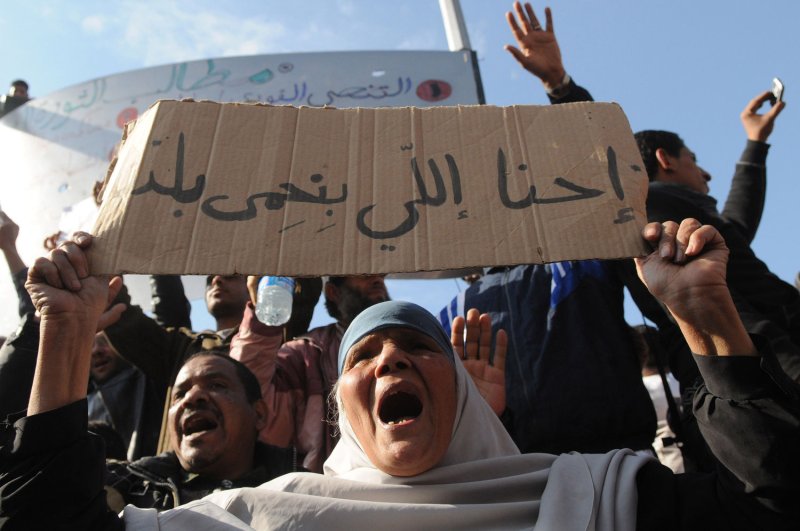Egyptians rally in Cairo's main square during a large anti-government protest in a bid to topple the government President Hosni Mubarak in Cairo, Egypt on January 30, 2011. UPI |
License Photo
BERLIN, Feb. 1 (UPI) -- The popular uprising in Egypt has left Europe navigating uncomfortably between open support for democratic reforms and concerns that an anti-Western government could form in Cairo.
The spirit of freedom has been released in Egypt, and this spirit "will change the world, not just the Arab world," German Foreign Minister Guido Westerwelle Tuesday told reporters in Berlin.
Hundreds of thousands of Egyptians took to the streets Tuesday in Cairo to once again demand the ousting of President Hosni Mubarak, who has been supported by the United States and Europe for the past three decades.
The relentless demonstrations in Egypt have eroded Western backing for Mubarak but leaders in Europe and the United States are so worried about what could come next that they have stopped short of calling for his resignation.
"We want a democratic development in Egypt," Westerwelle said, trying to explain Europe's dilemma with Egypt. "What we don't want is that a democratic wave pushes radical extremists to power."
Asked whether Mubarak should resign, Westerwelle said it wasn't the West's job to determine who should take the helm in Cairo. "That is exclusively a matter for the Egyptian people," he said.
For the same reason, Europe hasn't lent its backing to opposition figure Mohammed ElBaradei, who in 2005 won the Nobel Peace Prize for his leadership of the International Atomic Energy Agency, the United Nations' nuclear watchdog.
Under Mubarak, Egypt has been a stabilizing factor in the Middle East peace process and one of just two Arab countries to be at peace with Israel.
The looming threat of the Muslim Brotherhood, an opposition group that could fill the power balance in Egypt, has Western leaders worried. The Muslim Brotherhood has renounced violence but has links to Hamas and a strong grassroots backing.
Some Western leaders fear a development similar to the 1979 Islamic revolution in Iran, when, after a peaceful uprising, the hard-line, Western-backed Shah government was replaced with a regime that turned out to be worse for Western relations.
In Egypt itself, however, a devastating economy, human rights abuses and widespread corruption have frustrated the population. Critics say U.S. and European leaders have been too lax with Mubarak for too long -- for the sake of regional stability and their own security interests.
And as thousands of secular Egyptians have been marching, not for fundamentalism but for democracy and decent jobs, the West is in danger of standing on the wrong side of history.
"We have to balance our ideals and also our strategic interests," former U.S. Defense Secretary William Cohen said Monday in an interview with CNN. "That balance might have been too far in one direction and not the other."
On Monday, the 27 foreign ministers from the European Union issued a statement calling on Mubarak to release peaceful protesters, stop the jamming of the communications system and "embark on an orderly transition through a broad-based government leading to a genuine process of substantial democratic reform."
That this reform will include Mubarak looks increasingly unlikely whether the West likes it or not.





